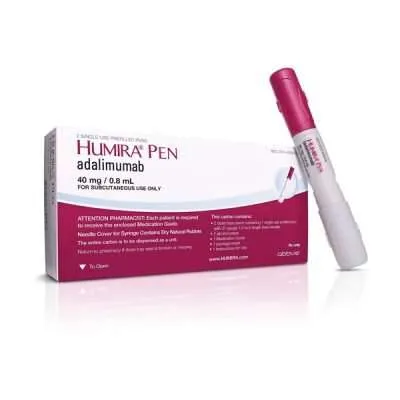HUMIRA® (adalimumab)
$2,199.95
Reasons to buy

HUMIRA® (adalimumab)
The Food and Drug Administration (FDA) have approved biosimilar versions (biosimilars are similar or exact copies of a brand-name drug) of Humira such as: Abrilada, Amjevita, Cyltezo, Hadlima and Hyrimoz.
The active drug in Humira is called adalimumab.
USAGE
Your doctor or pharmacist should provide instructions on how to properly administer the medication. It should also include an information packet with further instructions and information.
Storage
Humira must be kept cold and stored in the refrigerator. It is delivered in an insulated container to maintain its integrity.
Keep it in its original packaging until ready for use.
Do not freeze or ever use if it was previously frozen.
Keep medication away from direct sunlight.
When ready to use, take out of refrigerator and let naturally warm up. Do not try to warm it up faster.
When travelling or when not able to keep medication cold, Humira can be stored at room temperature (up to 77 degrees) for up to 2 weeks. Humira can be kept unrefrigerated for up to 14 days. If it exceeds 2 weeks or this temperature, d no not use.
When disposing of medication, do not flush down wastewater (i.e. toilet or sink) or put in household trash. Discard this medication according to your pharmacists instructions when expired or no loner needed.
SIDE EFFECTS
Humira can lead to mild or serious side effects. The following information below provides side effects that may occur when taking Humira but not limited to all possible side effects.
Consult your doctor and pharmacist for more information on the possible side effects associated with Humira.
Mild Side Effects
Mild side effects experienced by patients using Humira include:
- injection site reactions (pain, swelling and itching near areas of injection)
- headache
- respiratory infections such as colds
- rash
Most side effects are known to go away within a few days or weeks. If they don’t go away or worse, consult your physician.
Serious Side Effects
If you experience serious side effects related to takin Humira, consult your doctor immediately. If you feel the symptoms are life threatening seek medical emergency by calling 911.
Serious side effects experienced by patients taking Humira include:
Heart failure
Symptoms may include:
- sudden weight gain
- shortness of breath
- swelling of feet and ankles
Lupus-like syndrome (an immune system reaction)
Symptoms may include:
- shortness of breath
- join pain
- discomfort or pain in chest
- rash on arms and chest that worsen in sun
Nerve disorders or demyelinating diseases, such as multiple sclerosis (MS) or seizures.
Symptoms may include:
- vision problems
- dizziness
- tingling or numbness
- weakness in arms or legs
Blood disorders such as anemia (low levels of red blood cells):
Symptoms may include:
- bleeding
- bruising
- appearance of pale skin
- long-lasting fever
Liver damage
Symptoms may include:
- stomach ache
- loss of appetite
- vomiting
- jaundice (skin and eyes turn yellow)
-
Side effect details
Allergic Reaction
Humira like any medication may cause allergic reactions with some patients. 6% of those given Humira in clinical study of children with juvenile idiopathic arthritis experienced an allergic reaction within the first 48 weeks of treatment. It is unknown how many of the children receiving the placebo experienced allergic reactions.
In a separate study with children with Crohn’s disease (CD), 5% of the subjects experience mild allergic reactions. Of the children who received the placebo, it’s unknown how many had allergic reactions.
For those taking other medications along with Humira, it is unknown how often allergic reactions occurred.
Symptoms of allergic reactions may include:
- skin rash
- itchiness
- flushing of skin (warmth and reddening of skin)
It’s possible but rare for severe allergic reactions when taking Humira. However, it’s not known how often these have occurred during clinical trials.
Symptoms of a severe allergic reaction may include:
- difficulty breathing
- swelling under the skin, typically the hands & feet, eyelids and lips
- swelling of throat, mouth or tongue
Contact a doctor immediately if you feel you are experiencing a severe allergic reaction. If you feel symptoms are life-threatening you should seek medical emergency or call 911.
Long Term Side Effects
Long-term side effects can occur for patients using Humira. These can include the growth of tumors or the development of cancer such as Lymphoma.
Consult your doctor if you have any concerns about the long-term side effects associated with Humira.
Injection Site Reaction
Injection site reactions are common with taking injectable medications including Humira. This was the most common side effect found during clinical studies. It was reported during the study, 20% of subjects taking Humira developed injection site reactions vs 14% of those taking the placebo.
7% of patients stop taking Humira due to injection site reactions. In most cases, the reactions are mild and don’t impact a patients daily life.
Symptoms of injections site reactions may include: swelling, redness, itching, pain or bleeding.
Inform your doctor if you experience injection site reactions during your Humira treatment. Your doctor may provide guidance to help with injection site reactions and ease any discomfort.
Weight Gain
In clinical studies, weight gain wasn’t reported. Weight gain has been reported when used with medications such as TNF (tumor necrosis factor) blockers.
Cancer (such as lymphoma)
Humira includes a black box warning on the packaging as the medication has been known to increase the risk of cancer such as lymphoma. Humira, like other TNF blockers, have been linked to an increased risk of cancer.
| Quantity | 40mg/0.8mL – 2 pens, 40mg/0.8mL – 2 syringes |
|---|
